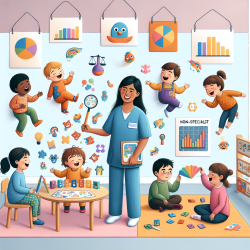As a practitioner dedicated to improving outcomes for children with intellectual disabilities or lower-functioning autism spectrum disorders (ASD), leveraging the latest research is crucial. The systematic review titled "Non-Specialist Psychosocial Interventions for Children and Adolescents with Intellectual Disability or Lower-Functioning Autism Spectrum Disorders" offers significant insights that can enhance your practice. Here's a breakdown of the key findings and how you can implement them effectively.
Key Findings from the Systematic Review
The review analyzed 29 studies involving 1,305 participants, focusing on psychosocial interventions delivered by non-specialist providers. The findings underscore the effectiveness of these interventions in various developmental and behavioral outcomes:
- Behavior Analytic Interventions: These interventions showed the best outcomes for development and daily skills, particularly for children under 6 years old. Intensive behavioral treatments delivered mostly in one-on-one instructional formats were highly effective.
- Cognitive Rehabilitation, Training, and Support: These interventions were most effective for improving developmental outcomes in children aged 6-11 years. The best results were seen in school settings, where structured curricula were implemented.
- Parent Training Interventions: Parent training showed significant improvements in developmental, behavioral, and family outcomes. These interventions were most effective when conducted in clinical settings with regular supervision.
Implementing Findings in Your Practice
To translate these findings into actionable strategies, consider the following approaches:
1. Behavior Analytic Interventions
For younger children with ASD, implementing behavior analytic techniques can yield substantial benefits. Focus on the following:
- Individualized Instruction: Utilize one-on-one sessions to address specific developmental and daily skill needs.
- Intensive Treatment: Aim for high treatment densities, ideally more than 10 hours per week, with a duration of at least 52 weeks.
- Supervision and Training: Ensure that non-specialist providers receive extensive training and ongoing supervision to maintain treatment fidelity.
2. Cognitive Rehabilitation, Training, and Support
For school-aged children, integrating cognitive rehabilitation strategies can enhance developmental outcomes:
- Structured Curricula: Implement evidence-based curricula that focus on literacy, language, and cognitive skills.
- School-Based Interventions: Leverage the school environment to provide consistent and structured support.
- Regular Assessment: Monitor progress using standardized developmental and cognitive assessments to tailor interventions.
3. Parent Training Interventions
Empowering parents through training can significantly impact family and developmental outcomes:
- Clinic-Based Training: Conduct training sessions in clinical settings to provide parents with the skills needed to support their child's development.
- Low-Density Sessions: Opt for weekly sessions lasting 60-120 minutes over 8-16 weeks, ensuring that the training is manageable for parents.
- Support and Supervision: Provide ongoing support and supervision to parents to reinforce training and address challenges.
Encouraging Further Research
While the review provides a robust foundation, continued research is essential to refine and expand these interventions. Practitioners are encouraged to:
- Participate in Research: Engage in or support studies that examine the effectiveness of non-specialist interventions in diverse settings.
- Share Findings: Disseminate successful strategies and outcomes within the professional community to build a collective knowledge base.
- Advocate for Resources: Advocate for resources and support to implement and sustain these interventions, particularly in low-resource settings.
To read the original research paper, please follow this link: Non-Specialist Psychosocial Interventions for Children and Adolescents with Intellectual Disability or Lower-Functioning Autism Spectrum Disorders: A Systematic Review.










